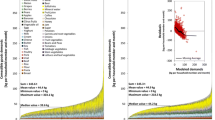Abstract
This study was aimed at develo** a better understanding of environmental pressure of urban household consumption in China. First, we introduced the concept model of household metabolism. Using this model, we analyzed the changes of Chinese household metabolism during the last 20 years. Rather than taking into account all aspects of household consumption, we just focused on water and energy metabolisms. After exploring the clearly increasing trends of urban household metabolism in China, we identified the underlying driving forces as biological/physical factors, economic/marketing factors and demographic factors. In conclusion, we suggest that additional work must be carried out in a wider range of household activities and at more advanced research levels in China.
Similar content being viewed by others
References
U. Ayres Simonis Rober E. Udo (1994) Industrial metabolism. United Nations University Press Tokyo
Brockett, D., Fridley, D., Lin, J. M., & Lin, J. (2002). A tale of five cities: the China residential energy consumption survey. In ACEEE summer study on building energy efficiency. Lawrence Berkeley National Laboratory.
InstitutionalAuthorNameBureau of Statistics (2001) China statistical yearbook. China Statistics Press Bei**g
China’s Agenda 21. (1994). White paper on China’s population, environment, and development in the 21st century. Bei**g: Chinese Environmental Sciences Publisher.
InstitutionalAuthorNameDepartment of Industrial and Transportation Statistics (1998) China energy statistical yearbook (1991–1996). China Statistical Publishing House Bei**g
InstitutionalAuthorNameDepartment of Industrial and Transportation Statistics (2001) China energy statistical yearbook (1997–1999). China Statistical Publishing House Bei**g
Fischer-Kowalski Hüttler Marina (1998) ArticleTitleSociety’s metabolism: Review of the intellectual history of materials flow analysis Part II: 1970–1998. Journal of Industrial Ecology 2 IssueID4 107–136
E. Geyer-Allely A Zacarias-Farah (2003) ArticleTitlePolicies and instruments for promoting sustainable household consumption. Journal of Cleaner, Production 11 IssueID8 923–926
Ken Green Philip Vergragt (2002) ArticleTitleTowards sustainable households: a methodology for develo** sustainable technological and social innovations. Futures 34 381–400
Hirschl Bernd Konrad Wilfried Scholl Gerd (2003) ArticleTitleNew concept in product use for sustainable consumption. Journal of Cleaner Production 11 IssueID8 873–881
X. L. Hu (2001) Evaluation of technology and countermeasure for greenhouse gas mitigation in China. Chinese Environmental Sciences Publisher Bei**g
Improving living quality of Chinese urban resident. (2003). In a series of reports prepared for the 16th national congress of communist party of China. National Bureau of Statistics of China.
B. Leeuw (2004) Ten-year framework on sustainable consumption and production. Huback Klaus Inaba Atsushi Stagl Sigrid (Eds) Proceedings of international workshop on driving forces and barriers to sustainable consumption. University of Leeds Leeds 80
Li, F. X. (2003). Necessarily of supply water based on quality need. Economic Information Daily of China. July 20.
J. L. Liu (2001) Green life and our future Chemical Industry Press Bei**g
Lorek Sylvia H. Spangenberg Joachim (2001) ArticleTitleIndicators for environmentally sustainable household consumption. Journal of Sustainable Development 4 IssueID1 101–120
L. Michaelis (2003) ArticleTitleThe Oxford Commission on sustainable consumption. Journal of Cleaner Production 11 IssueID8 931–933
Ministry of Water Resource of China. Chinese water resource reports (1997–2001)
Moll, Henri C., & Noorman, Klass Jan. (2003). Sustainable consumption at city level: evaluating and changing the household metabolism in five European cities. In Abstracts from the second industrial ecology for a sustainable future conference. University of Michigan, Michigan, pp. 43–44
K. J. Noorman (1998) Green households? domestic, consumers, environment and sustainability. Earthscan Publications Ltd London
K. J. Noorman Jolivet Patrick (2001) ArticleTitleIntroduction. International Journal of Environment and Pollution 15 IssueID2 123–126
Organisation for Economic Co-operation and Development. (2002). Household energy & water consumption and waste generation: Trends, environmental impacts and policy response. Paris: Organisation for Economic Co-operation and Development.
Ray, K. (1998). Promoting sustainable consumption in Asian cities. In United Nations Centre for Human Settlements (Eds.). Promoting Sustainable Consumption in Asian Cities, Nairobi
G. A. Rood J. P. M. Ros E. Drissen K. Vringer (2003) ArticleTitleA structure of models for future projections of environmental pressure due to consumption. Journal of Cleaner Production 11 IssueID5 491–498
SHI, X. C. (2002). An introduction of water price system in foreign countries. Report on forum of Chinese water price reform. Haikou (China)
Schmidheiny Stephan (1992) Changing course: A global business perspective on development and the environment. The MIT Press London
X. T Song (2001) ArticleTitleDevelopment and strategies of China’s water and wastewater. China Water & Wastewater 16 IssueID1 21–25
Song, X. T. (2004). Water consumption efficiency of Chinese cities. China Construction Newspaper. March 19.
Throne-Holst Holst Benders Rene Falkena Henk-Jan Moll Henri K. J. Noorman (2002) Household metabolism: Norwegian national report National Institute for Consumer Research Lysaker
InstitutionalAuthorNameUnited Nations (1999) Promoting sustainable production and consumption: five policy studies. United Nations New York
InstitutionalAuthorNameUnited Nations Environment Programme (2002) Sustainable consumption—a global status report. United Nations Environment Programme Paris
Urban Social and Economic Survey Organization. (1990). The forty years of urban development of China. Bei**g: Co-published by China Statistical Information and Consultancy Service Center & International Center for the Advancement of Science and Technology Limited.
X. H Wang (2003) ArticleTitleEnergy consumption with sustainable development in develo** country: a case in Jiangsu, China. Energy Policy 31 IssueID15 1679–1684
J. D Yang X. F. Qin (2000) Introduction of sustainable consumption. Economy Publishing House Bei**g
Zhou H., NIU W. J., & J.I H. (2003). Analysis of residential power consumption in summer with various influence factors. North China Electric Power, 21(3), 12–14.
Author information
Authors and Affiliations
Corresponding author
Rights and permissions
About this article
Cite this article
Liu, J., Wang, R. & Yang, J. Metabolism and Driving Forces of Chinese Urban Household Consumption. Popul Environ 26, 325–341 (2005). https://doi.org/10.1007/s11111-005-3345-8
Issue Date:
DOI: https://doi.org/10.1007/s11111-005-3345-8




